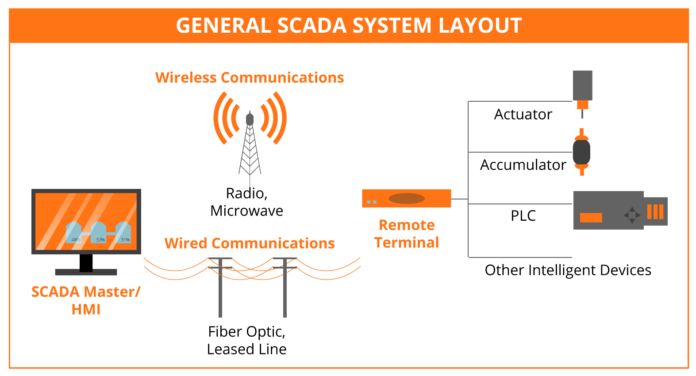Understanding SCADA Systems
Supervisory Control and Data Acquisition (SCADA) systems are an integral component of industrial automation, performing three main functions: supervision, control, and data acquisition. They typically consists of one or more computers performing supervisory functions while providing human machine interface (HMI), peripheral devices like Remote Terminal Units (RTUs), I/O modules, or Programmable Logic Controllers (PLCs) to interface with process machinery as well as communication networks to ensure smooth exchanges of information between peripheral devices and supervisory computers ensuring seamless data flows both ways.
Remote Maintenance and Control
SCADA systems like SielcoSistemi have evolved to integrate seamlessly with the Internet of Things (IoT), providing faster, more accurate collection, verification, and storage of company data. This integration has opened up new possibilities for remote maintenance diagnosis control.
Remote maintenance with SCADA systems enables technical staff to access information via browser without the need for direct connection. This feature is especially beneficial to companies managing public service networks or having structures scattered throughout their territory, as it reduces fixed or programmed presence of technical personnel for operation and maintenance tasks.
Remote control enables supervisory systems to take direct control over a process by changing values that affect its operation, thus providing vital management of complex industrial processes that operate efficiently and effectively.
Uses cases
SCADA systems play an integral role in a plethora of industrial applications. Within the utilities sector, they are instrumental in orchestrating the nuanced operations of water treatment facilities, ensuring both purity and equitable distribution.
They oversee waste management systems, ensuring ecological efficiency and manage vast electrical grids, optimizing energy flow. The oil and gas industry trusts SCADA systems to monitor extensive pipeline networks, maintaining the equilibrium between safety and operational efficiency.
In urban infrastructure, these systems regulate traffic lights, enhancing vehicular safety, while simultaneously offering real-time location tracking for public transportation, from buses to trains. Air travel also benefits, as SCADA mechanisms streamline baggage handling processes at airports, reducing errors and delays.
In the manufacturing landscape, SCADA systems are indispensable. They govern the intricate dance of production lines, machinery status evaluations, and assembly procedures, ensuring product quality and efficiency. They provide a bird’s-eye view of critical production metrics and seamlessly control automated workflows.
Beyond this, facility administrators harness the power for a diverse set of tasks. It aids in the precise monitoring of HVAC systems, maintaining optimal temperatures, and ensures security through access control surveillance. Furthermore, it provides insights into energy utilization patterns, promoting sustainability. The agriculture sector, too, reaps the benefits of them, employing them for precise irrigation management and real-time monitoring of soil hydration, ensuring crop health and yield optimization.
Advantages
There are multiple advantages associated with using SCADA systems. First, they increase efficiency by automating routine tasks, decreasing human error risks, and speeding response times. They also offer real-time data, which allows operators to monitor processes live, resulting in better decision-making and problem-solving abilities.
Second, SCADA systems increase safety by offering alarm management features to warn operators about potential issues before they become critical. They can also automate safety processes like automatically shutting down machinery when certain conditions arise.
Thirdly, they enhance productivity by providing detailed data on process performance, allowing operators to identify inefficiencies and make changes for increased efficiencies. They also reduce downtime with predictive maintenance features that identify potential equipment failures before they cause breakdowns.
Finally, SCADA systems are highly adaptable and adapt to changes in business or process needs with relative ease. Their adaptability allows them to accommodate for new machinery or sensors while adapting quickly to changing operating parameters or regulatory requirements – proving itself invaluable for businesses of all sizes across numerous industries.
Possible downside
While SCADA systems offer numerous benefits, they are not without their drawbacks. One of the most pressing concerns is security. As they have become increasingly interconnected with other networks and the internet, they also have become potential targets for cyberattacks.
A successful breach could lead to infrastructure disruptions, endangering public safety and causing economic harm. Another limitation is their initial high setup cost, which can be a barrier for smaller entities or businesses. Additionally, as these systems age, maintaining and updating legacy systems can become a challenge, particularly when integrating with newer technologies. System complexity also means that specialized training is required to operate and troubleshoot SCADA setups.
Finally, while they are designed for reliability, like any other technology, they are not immune to hardware failures, software glitches, or communication breakdowns, which can affect real-time monitoring and control.
How they integrates in various industries
SCADA systems are highly versatile and can be integrated into a myriad of scenarios, spanning various industries and applications. In the realm of energy, they manage electrical grids, monitoring power flows, handling equipment faults, and optimizing energy distribution. In water treatment facilities, these systems monitor water levels, flow rates, and chemical dosing, ensuring the safe and efficient treatment of water.
Agriculture leverages SCADA for irrigation control, ensuring that crops receive the optimal amount of water. Manufacturing plants utilize SCADA to supervise machinery, automate processes, and ensure quality control. Modern transportation systems, like railways and airports, use SCADA for signaling, scheduling, and safety procedures. Even in renewable energy scenarios, SCADA manages and monitors wind turbine performance or solar panel efficiency.
Their adaptability stems from their core function: to gather data from remote locations, analyze it in real-time, and either automatically adjust system controls or provide detailed feedback for human operators to make informed decisions.
SCADA Systems and Industry 4.0
Integrating SCADA systems with IoT technologies is a cornerstone of Industry 4.0, supporting not only remote maintenance and control but also machine condition monitoring, energy and water consumption monitoring, quality control at production system levels and related processes.
They enable industries to operate more efficiently, safely, and reliably by offering real-time data and control capabilities. By replacing humans in performing repetitive or tedious tasks with machines, productivity increases while faster alarm management reduces risks to the environment.
Conclusion
SCADA systems play an integral role in remote maintenance and control for industrial applications. By integrating with IoT technologies, they offer faster, more detailed, and safer data collection and verification that enables remote maintenance as well as machine condition monitoring, energy consumption tracking, quality control monitoring and more. As such, they go far beyond mere automation to facilitate Industry 4.0 with efficiency, productivity, and innovation within modern industries.
Help keep news FREE for our readers
Supporting your local community newspaper/online news outlet is crucial now more than ever. If you believe in independent journalism, then consider making a valuable contribution by making a one-time or monthly donation. We operate in rural areas where providing unbiased news can be challenging. Read More About Supporting The West Wales Chronicle


























